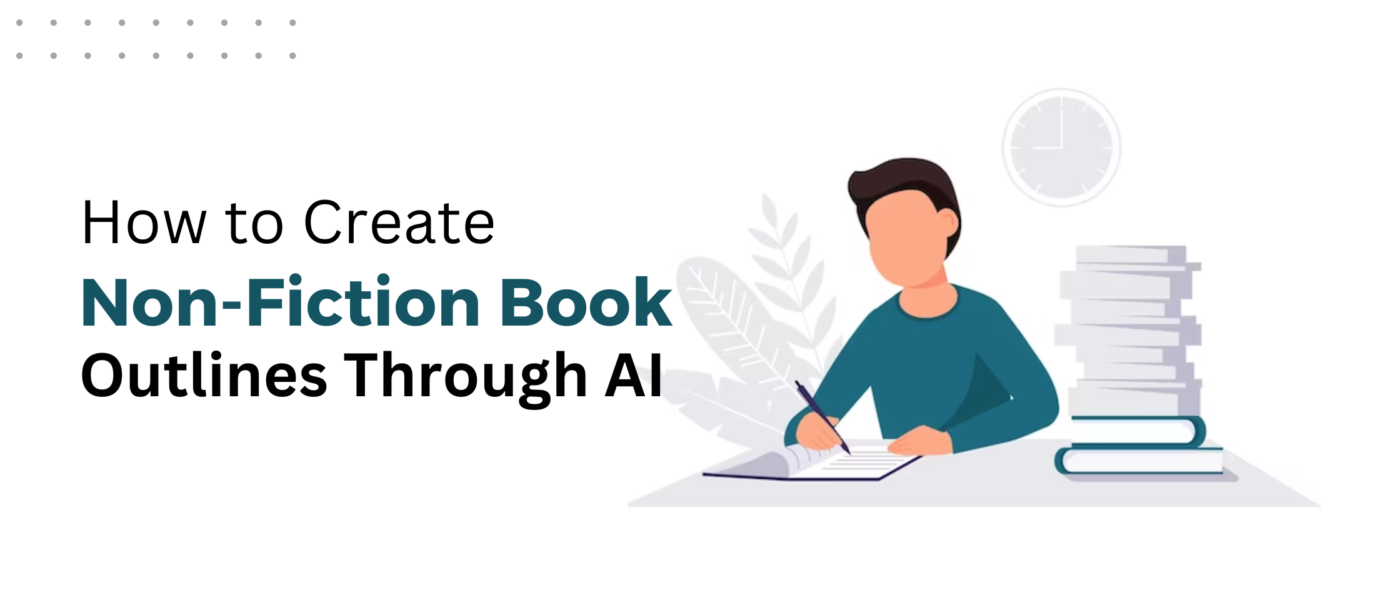In the ever-evolving landscape of book publishing, authors are continually seeking innovative ways to streamline their writing process and create compelling non-fiction books. With the advent of artificial intelligence (AI), authors now have access to tools that can assist in generating outlines for their non-fiction works. In this blog, we explore how to create non-fiction book outlines through AI, revolutionizing the way authors organize their ideas and streamline their writing journey in the publishing world.
AI in Non-Fiction Book Outlining:
AI algorithms are trained on vast amounts of data, including existing non-fiction books, research papers, and scholarly articles. These algorithms can analyze and extract key concepts, topics, and structures to generate comprehensive outlines for non-fiction books.
Efficiency and Time Savings:
Utilizing AI-powered outlining tools can significantly enhance efficiency and save valuable time for authors in the realm of free book publishing. AI algorithms can quickly analyze large volumes of content, identifying key themes and structuring ideas. Authors can focus on fleshing out the content rather than spending excessive time organizing their thoughts.
Comprehensive Content Organization:
AI-powered outlining tools enable authors to organize their non-fiction book ideas in a structured and comprehensive manner. By analyzing similar works in the genre and related fields, AI algorithms can suggest logical chapter divisions, subtopics, and content flow, ensuring a well-structured and cohesive book.
Topic Clustering and Categorization:
AI algorithms can cluster and categorize relevant topics, enabling authors, including those collaborating with publishing companies, to identify overarching themes and subtopics within their non-fiction books. By grouping related ideas together, authors can ensure that their content is coherent and organized, enhancing reader comprehension and engagement.
Research Assistance:
AI-powered outlining tools can assist authors in conducting research for their non-fiction books. By providing suggestions for primary and secondary sources, relevant studies, and authoritative references, AI algorithms facilitate the research process and help authors enrich their content with credible information.
Personalization and Customization:
AI tools allow authors to customize and personalize their outlines based on their specific book goals and target audience, especially in the context of Book-Publishing online. Authors can input keywords, preferred chapter structures, and outline styles to ensure that the generated outline aligns with their unique vision for the non-fiction book.
Collaboration and Iteration:
AI-powered outlining tools facilitate collaboration between authors and algorithms. Authors can provide feedback on the generated outline, allowing the algorithms to learn and refine subsequent iterations. This iterative process ensures that the final outline reflects the author’s voice and objectives while benefiting from AI-driven suggestions.
Important AI Outlining Tools:
a) Coggle: Coggle is an AI-powered mind mapping tool that helps authors generate visual outlines for their non-fiction books. It allows for collaborative brainstorming, the organization of ideas, and easy navigation of content hierarchies.
b) Write Mapper: Write Mapper is an outlining tool that utilizes AI algorithms to generate visual and interactive outlines. Authors can easily rearrange and connect ideas, ensuring a logical flow for their non-fiction books.
c) Atomic AI: Atomic AI is an AI-powered content optimization tool that assists authors in creating outlines for their non-fiction books. It analyzes existing content and suggests topic clusters and subtopics to enhance content organization and structure.
The power of AI in creating outlines for non-fiction books, as demonstrated in “How to Create Non-Fiction Book Outlines through AI,” is revolutionizing the publishing industry, offering authors valuable tools to streamline their writing process. By leveraging AI algorithms to generate comprehensive and well-structured outlines, authors can save time, enhance efficiency, and ensure that their non-fiction books resonate with readers. From efficient content organization and topic clustering to personalized customization and research assistance, AI-powered outlining tools empower authors to create impactful non-fiction books that engage and inform readers.
While AI can assist in the outlining process, authors should remember that their unique insights and expertise remain invaluable, especially in the context of self-publishing in India. AI-generated outlines should be viewed as a starting point for further exploration and refinement. The collaborative synergy between human creativity and AI-driven tools can unlock the full potential of non-fiction book writing, enabling authors to make a lasting impact in the publishing world. Embrace the power of AI and embark on your non-fiction writing journey with a well-structured outline that sets the stage for success, particularly in the dynamic landscape of self-publishing in India.





